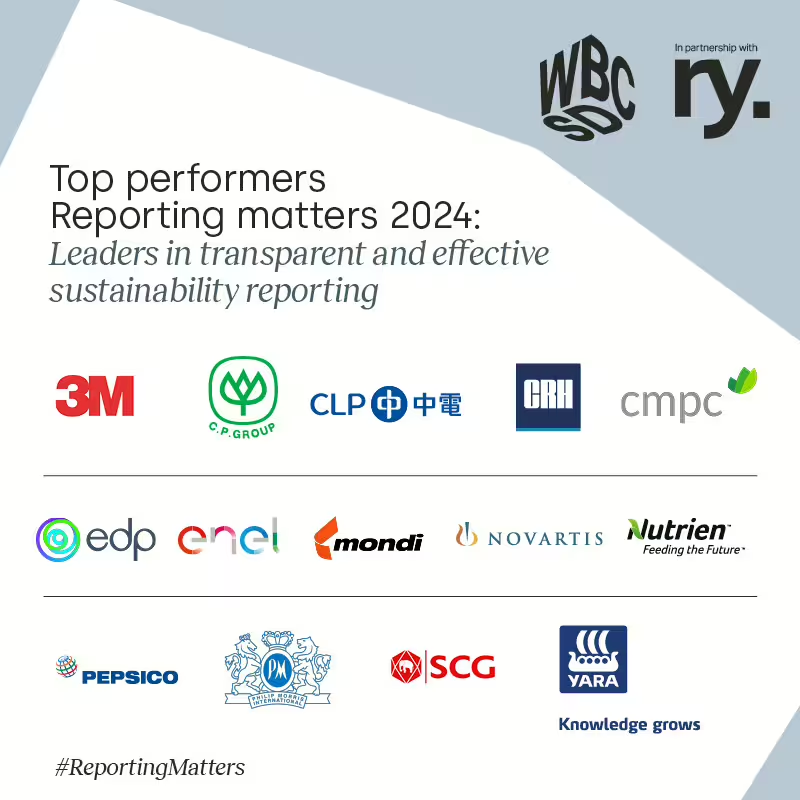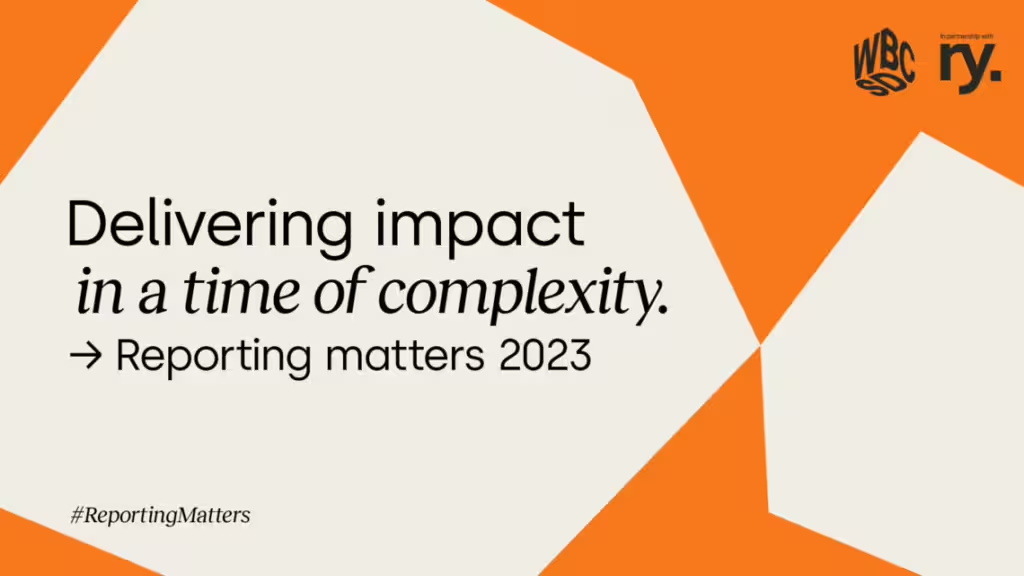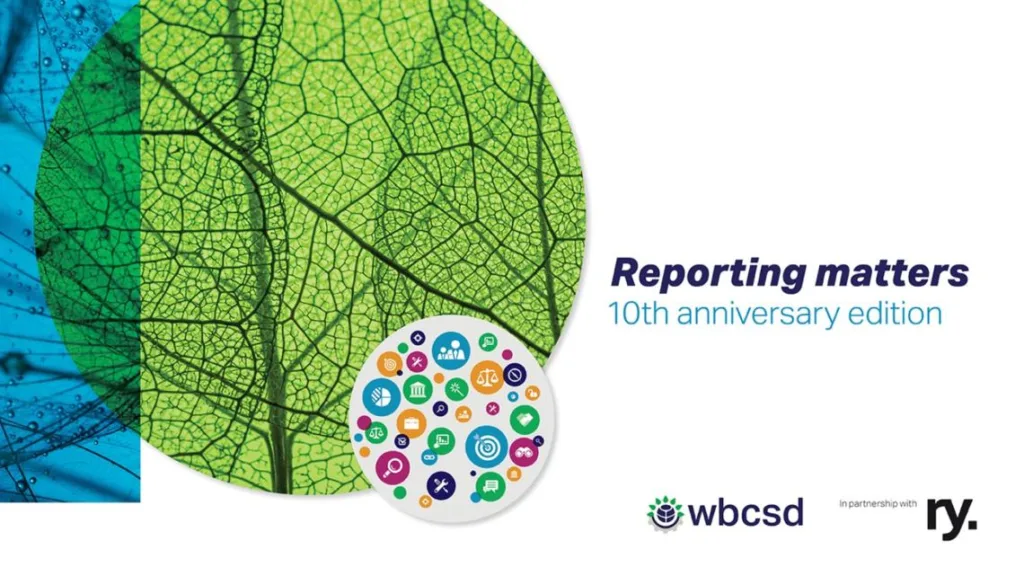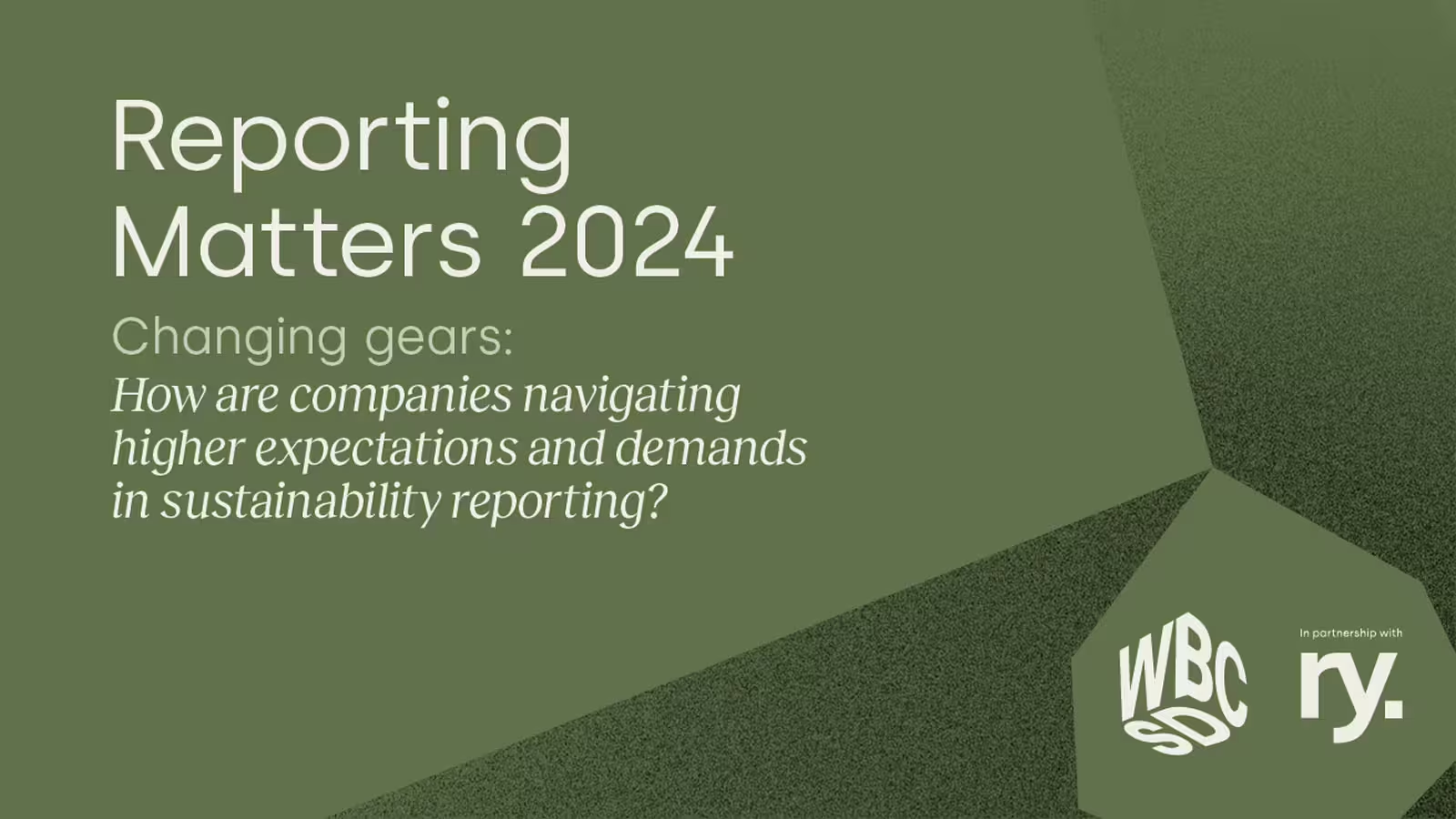Engage with the report in an innovative way by exploring our interactive format (via Readymag) for a dynamic look at the findings, designed to enhance accessibility and understanding. Dive into an interactive layout that allows you to explore insights, data, and case studies directly within the digital report.
Geneva, 7 November 2024 – Reporting matters, WBCSD’s leading initiative in partnership with Radley Yeldar, aimed at enhancing the effectiveness of corporate sustainability reporting, is proud to unveil its 2024 edition, titled “Changing Gears: How are companies navigating higher expectations and demands in sustainability reporting?”.
In its twelfth edition, Reporting matters 2024 continues to serve as a pivotal resource for WBCSD’s member companies and reporting practitioners, providing comprehensive insights into how effective reporting adds value and provides strategic direction.
Packed with the latest reporting trends and data gathered from an in-depth review of 181 reports, this edition offers reporting practitioners fresh insights into key developments in the reporting landscape. Featuring perspectives and practical advice from fellow practitioners who are actively navigating the transitions in reporting, the report includes strategic discussions with a focus on how to conduct a double materiality assessment, integrate sustainability into governance, activate report content for diverse audiences, and use the Sustainable Development Goals (SDGs) in a meaningful way. Finally, the report also signposts leading practice and useful resources across all aspects of effective reporting.
The pace of change in the sustainability reporting landscape is unprecedented, and companies are rethinking their strategies and structures to meet these new demands. With this edition, we aim to reflect on what companies are doing to manage the transition to more robust, meaningful, and impactful reporting, and on how Reporting matters can evolve to respond to those needs.
John Revess, Vice President Business Engagement at WBCSD
Key insights from Reporting matters 2024 include:
- Materiality: 77% of reviewed reports disclose a double materiality process, up from 55% in 2023. This significant shift reflects the growing importance of assessing both financial and non-financial impacts on society and the environment. Additionally, over half of the companies demonstrate a regular cadence in conducting their materiality assessments, with a smaller group (9%) adopting a dynamic approach that provides insights into how material topics evolve over time.
- Sustainability governance: Reporting on executive compensation linked to sustainability performance increased, with 73% of reports disclosing relevant metrics.
- Frameworks and standards: There is an upward trend in the number of reports referencing key frameworks and standards, such as the <IR> Framework, SASB and TCFD, and most notably mentions of nature-related frameworks and standards more than doubled for TNFD (from 22% to 52%) and SBTN (from 14% to 30%).
- External assurance: 90% of reports included external assurance, with an increase in reasonable assurance of key sustainability performance indicators.
- Good practice examples: This edition includes 35 good practice examples covering the full spectrum of the assessment framework and highlighting how companies from diverse sectors and geographies are adapting their reporting approaches in light of emerging requirements and evolving expectations.
Companies are not just preparing to comply with evolving standards but are also striving to lead on transparency and impact. This edition takes stock of how businesses are delivering tangible impact while navigating the complexities of regulatory changes.
Louise Ayling, Director of Sustainability at Radley Yeldar
Quality and usefulness of disclosures remain in the hands of preparers, from their materiality assessment to how they integrate reporting into business activities and practices.
Simon Rawson, Deputy Chief Executive at ShareAction
Rising expectations and evolving reporting requirements present near-term challenges worth rising to as we increasingly experience the impacts of a changing world. This requires an enterprise-wide approach across value chains for the integration of sustainability into the heart of business strategy to drive resilience and realize strategic competitive advantage.
Fiona Watson, Senior Director, Corporate Performance & Accountability at WBCSD
Top reporters
This year, Reporting matters recognizes 14 global companies whose reports reflect exceptional efforts and dedication to reporting, exemplify transparency and are focused on impact.

Reporting matters Advisory Group
For the first time this year, WBCSD established an Advisory Group including seven WBCSD member companies (Arçelik (now Beko), CLP Group, dsm-firmenich, EDP, Ingka Group (IKEA Retail), Sumitomo Forestry, and Vale International) representing diverse sectors and geographies, to draw on their expertise and reporting experiences in shaping the content of the publication. The Advisory Group adds another layer of rigor, transparency and scrutiny to help WBCSD remain at the forefront of the ever-changing sustainability reporting landscape. Advisory Group members were not involved or influenced the assessments process, data analysis or selection of interviewees featured in the publication.
For more insights, join us for the Reporting matters 2024 Launch Webinar on 7 and 8 November 2024.
For any questions and inquiries about Reporting matters, please contact reportingmatters@wbcsd.org.
For media and communications inquiries, please contact Zara Parian (parian@wbcsd.org) or Ellie Harris (e.harris@ry.com).
Outline
Related
Content

Reporting matters Brazil: CEBDS study analyzes sustainability reports from 77 large companies operating in Brazil
31 January, 2024

Reporting matters 2023 launches with a focus on impact amidst complexity
19 October, 2023

Ten years of Reporting Matters: reflecting on a decade and gearing up for the future
20 October, 2022
